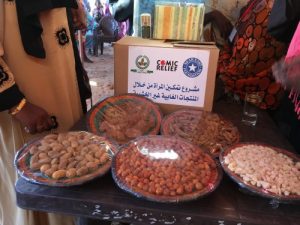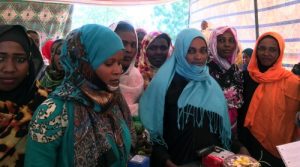NEF UK’s Empowering Women Through Non-Wood Forest Products (NWFP) project has seen substantial progress with its gender-focused value chain approach to using the harvesting of non-wood forest products to alleviate poverty while improving agency and inclusion for women. It has surpassed goals for reach, knowledge building, and increased income.
In Sudan, women make up 72% of those involved with the harvesting and selling of forest fruits but earn 80% less than men in the sector. NEF’s Comic Relief-funded efforts in rural Sudan are working to change this by introducing women’s voices into the negotiation process, creating market linkages, and establishing standard pricing. This is positively impacting the lives of women and their families in poor, remote Sudanese communities by  increasing their incomes and also improving the management of natural resources. NEF is working to introduce new techniques for producing and harvesting key non-wood forest products, such as gum arabic, desert dates, honey, sider, baobab, and other local forest fruits that improve quality but reduce the degradation of the trees that produce them. The formation and capacity building of local women’s associations is the main entry point for the empowerment process that NEF seeks to achieve for women in these communities. The women’s associations act as a cooperative for efforts around marketing, commercialization, sales, and management of these natural resources.
increasing their incomes and also improving the management of natural resources. NEF is working to introduce new techniques for producing and harvesting key non-wood forest products, such as gum arabic, desert dates, honey, sider, baobab, and other local forest fruits that improve quality but reduce the degradation of the trees that produce them. The formation and capacity building of local women’s associations is the main entry point for the empowerment process that NEF seeks to achieve for women in these communities. The women’s associations act as a cooperative for efforts around marketing, commercialization, sales, and management of these natural resources.
Six Month Update – Women’s Associations
(January – June 2018)
The second half of 2018 has provided an opportunity to evaluate the success of the last agriculture season which came to an end in the Spring in Kordofan.
At the association level, and through continuous facilitation and coaching, thirteen women’s associations have been able to sustain the services and benefits offered to their members through profit sharing, trading activities, and membership fees. The benefits of association membership include facilitating better sale contracts with wholesalers, producing/selling under a unified brand, facilitating organic certification, and access to credit and loans.
The profit generated by the women’s associations in the first five months of 2018 was GBP 19,256 (USD 25,335) and many are now operating revolving funds with 348 active clients that support working women and reduce the depletion of forests. This revolving fund provides loans for members to acquire items like butane gas cylinders for cooking to replace cookstoves that consume firewood and affect local forests. It also provides loans for brick making to replace the wood-dependent houses which deplete local forests, as well as loans for women to purchase harvesting equipment.
“Trainer of trainers” sessions brought together a range of stakeholders such as representatives from government ministries and local community leaders; a significant achievement in itself. On their own initiative, these two groups have decided to come together on a regular basis to collectively address issues surrounding natural resource management and conflict—ensuring that NEF’s efforts will be sustained long into the future.
Women beneficiaries have reported the ability to gain some economic independence as one of the most important benefits of the program. Marketing skills have proven popular among beneficiaries, with many trainees requesting additional training in this area.

From Overlooked to Outspoken
Ms. Raugia is a member of the women’s association participating in the project in Tafentara. In an interview at one of the women’s meetings, Ms. Raugia offered a few words regarding her impression of the project.
“Before the project, as women and according to our culture, we were no t allowed to go out or do anything to improve our economic situation, as these are activities are done solely by men. When the project started, it was so difficult for our relatives and husbands to accept the idea of allowing us to take part. Yet, after we got involved in project activities, they noticed the positive changes that began to occur within us as women and with respect to our economic situations as families. Now, we are of great help to our husbands and our families financially, and have become outspoken regarding many issues pertaining to our economic and social situations.”
t allowed to go out or do anything to improve our economic situation, as these are activities are done solely by men. When the project started, it was so difficult for our relatives and husbands to accept the idea of allowing us to take part. Yet, after we got involved in project activities, they noticed the positive changes that began to occur within us as women and with respect to our economic situations as families. Now, we are of great help to our husbands and our families financially, and have become outspoken regarding many issues pertaining to our economic and social situations.”
“Not only that, we became outspoken regarding many issues pertaining to our economic and social situation.”
Ms. Raugia continues, “Now, through this project, we became able to speak our minds, plan for ourselves, deal with our community issues, and manage our projects and activities within our associations. We are now comfortable taking the initiative to contact all the concerned government departments and companies regarding processing our permissions. We were not familiar with all of these skills before the project. With the self-confidence we have acquired, I can say that we can now represent the women of our community in every gathering and every official meeting.”
Starting the Journey to Advancement
Ms. Rashida, one of the members of the women’s association in Aman Alla village at Um Rawaba, expressed her enthusiasm with the project and the advancements it has achieved for the women in her village.
“I am so glad that I am involved in this project, as now I am a different person. Before the project, we used to regard the forest fruits, such as the baobab fruits and the desert dates, as something of no value. We used to collect these for the sake of our children to eat, yet we never thought about its monetary value and the profits we could gain from it. Through this project, we came to know the economic value of these fruits. In fact, when you look at almost all the women who are involved in these efforts and the women’s associations, they were completely dependent on their relatives and husbands and quite destitute. Now, you look at them, including me—we are quite different now. Having benefited so much from the forest fruits, we are more independent, and we are now of great help to our husbands and relatives.”
She continued, “After this change, even our children are now doing better in school and our husbands started to regard us in a different and positive way. They have given us more and more freedom to attend association meetings and get involved in group negotiations at the marketplaces. These are activities that we were not allowed to be involved with before. With this progress, we are now thinking of involving more women in membership with the associations and working towards improvements within the village such as supporting kindergarten and a women’s cooperative group. We have started this journey of female advancement and we will never stop.”
“Even our children are now doing better in school and our husbands have started to regard us in a different and positive way.”



